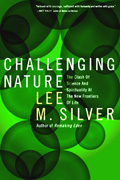 |
 |
How can you tell if a person's opposition to abortion and embryo research
is informed by religion and other pre-Darwinian ideas, even if the person claims otherwise? Here’s
a simple acid test.
Francis Fukuyama, like many other neoconservatives, claims that
religion has nothing to do with his opposition to embryo cloning and other human-affecting biotechnologies.
In Challenging Nature, I wrote
that Fukuyama's views were driven by a "traditional Christian conceptualization of a human soul." But
the science journalist Brian Alexander (who has taken Christian
fundamentalists to task in his other writings) says
in a book review that "God references are just handy devices in what amounts to a hard-boiled
political fight." In particular, he claims that Fukuyama is careful "not to appeal to religion," and
I should take him and others (who deny religious influences) at their word. In fact, Alexander
is playing right into their hands as I learned from an acid test for Judeo-Christian proclivities
that I ministered personally to Fukuyama.
|
A primer on the science and politics of religious denial by religionists
In a twist of irony, pro-life advocates and assorted opponents of embryo
research have discovered the benefits of embracing science and avoiding
religion in
the public square. When the South
Dakota legislature voted to ban abortion, they appealed to "scientific
studies" and "scientific
advances" since Roe v. Wade to conclude that "each human being is
totally unique immediately at fertilization." Among the architects of this
new strategy is Robert P. George, a right-wing Catholic and professor of politics
at Princeton, who thinks it's immoral for a husband and wife to engage in
sex for pleasure alone, and who pledged (according
to The Nation's Max Blumenthal) to continue "respecting the rights
of conscience of my fellow citizens who believe that the killing
of abortionists is sometimes a tragic necessity--not a good, but a lesser evil."
Remarkably, George claims that his Catholicism has nothing
to do with his views of human life. Instead, he's written repeatedly that,
"the
scientific evidence establishes the fact that each of us was, from conception,
a human being. Science, not religion, vindicates this crucial premise of the
pro-life claim." What scientific evidence is he talking about? Eric Cohen,
editor of The
New Atlantis explains in his article, The
Embryo Question II: The Tragedy of Equality:
"If we trace an individual life backwards biologically�from adulthood to
adolescence to infancy to birth to the fetal stage to the embryonic stage�there
is only one bright line that separates being from non-being: fertilization."
In other words, since all scientists agree that embryonic development is
continuous, any sharp line that anyone attempts to draw -- after fertilization
-- between non-human beingness and human beingness is arbitrary.
In fact, I think the logic of this argument is quite robust.
The problem lies entirely in the critical assumption (usually
left unstated) underlying the argument. As George
explains it: being
a whole human organism (whether immature or not) is an either/or matter�a
thing either is or is not a whole human being." But since Darwin, biologists
have known this assumption is false -- there is no sharp line between non-humans
and human beings during evolution, and there need not be one during development
from an embryo to a baby. Although the counter-argument {human beings were created instantaneously
as a species, and they are conceived instantaneously, one-by-one} has Greek origins, it becomes
entirely religious in the light of modern scientific understanding.
An acid test for religious proclivities -- which may exist covertly or
subconsciously -- needs to avoid direct engagement with issues of religious contention
like evolution and embryonic development. The test should instead be a thought-experiment
about fully mature potential-human beings that scientists could actually bring to life
based on current knowledge and technology. Here it is:
Imagine that human and chimp cells isolated from early embryos are brought
together to create a mixed-species chimeric embryo. If the embryo is allowed to develop
to term, a healthy partial-chimp/partial-human child could be born with any proportion of
chimp and human cells (from 1% to 99%) in each tissue and organ. The question I posed to
Francis Fukuyama is whether he thought every one of these individuals could be definitively
classified either as a human being or as a non-human being; the alternative idea is that
no sharp line exists anywhere along a continuum from chimp to human (and, by inference,
between embryo and child), even though the extremes clearly fall into two different categories.
Fukuyama's response was that each adult chimera had to be a human being
or a non-human being because there was no such thing as a partial human adult. This answer
reveals the Judeo-Christian intuition (conscious or subconscious) at the core of a person's
belief system; it is fundamentally in opposition to post-Darwinian scientific understanding.
But it's not just themselves that some neocons are fooling; it's independent supporters
of biomedical research, like Brian Alexander, who think it's mostly just politics.

